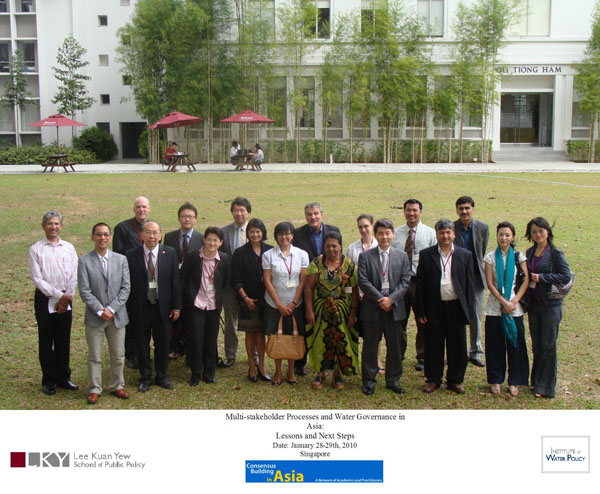International Workshop 2010: Multi-stakeholder Processes and Water Governance in Asia: Lessons and Next Steps
January 28-29, 2010
LKY School of Public Policy, National University of Singapore,
Singapore
Organized by: Consensus Building in Asia: A Network of Academics and Practitioners
Hosted by:
Lee Kuan Yew School of Public Policy,
National University of Singapore
Sponsored by:
Institute of Water Policy,
National University of Singapore
Program:
Thursday, January 28, 2010
9.00-10.30 Introductions and Keynote Address
Welcome: Dr Seetharam Kallidaikurichi Easwaran, Director, Institute of Water Policy
Introduction: Boyd W. Fuller
Keynote Address: Professor Peter Adler, President & CEO, The Keystone Center
11.00-13.00 Participatory water management
Michelle Kooy, Urban Program Director, Mercy Corps Indonesia.
Yan Jia, Consultant, Zhen Ai Education Organization, China
Mrs. Padma D. Jayaweera, Chair Person, Cooperative Employees Commission of the Central Government, India
14.00-16.00 Mekong river initiatives
Teresita del Rosario, Senior Researcher, Centre on Asia and Globalisation, National University of Singapore, Singapore.
Suparerk Janprasart, Sociologist/Socio-economist, Basin Development Plan Program, Mekong River Commission Secretariat, Laos
Vanchai Vatanasapt, Director, Center for Peace and Governance, King Prajadhipok's Institute, Thailand
16.30-17.50 Government supported community processes
Boyd Fuller, Assistant Professor, LKY School of Public Policy, National University of Singapore, Singapore.
Vibhu Nayar, Executive Member, UN-GWOPA, India
Friday, January 29, 2010
9.00-11.00 Reflections on the First Day
Boyd Fuller, Assistant Professor, LKY School of Public Policy, National University of Singapore.
Multi-stakeholder dialogues
Andrew Lee, founder and CEO, Leading Negotiation, China.
Gwen B. Grecia de Vera, Director, Institute of International Legal
Studies, University of Philippines Law Center, Philippines.
Bishnu Raj Upreti, Regional Coordinator, South Asia Regional
Coordination Office, National Centre of Competence in Research North
South, Nepal
11.30-13.00 Multi-stakeholder dialogues (continued)
Dong-Young Kim, Assistant Professor, Korea Development Institute of Policy Analysis and Management.
Supanat Permpoonwiwat, Director, The Office of the Promotion of Politics for People, King Prajadhipok’s Institution, Thailand.
14.00-14.40 Oceans
Hideaki Shiroyama, Professor, Graduate School of Law and Politics, The University of Tokyo, Japan
14.40-16.15 Applying and reframing the framework
Masahiro Matsuura, Associate Professor, Graduate School of Public Policy, University of Tokyo, Japan
Mission statement:
Around Asia, government and non-government actors are using different kinds of multi-stakeholder
processes (MSPs) to discuss, design, implement, and evaluate public policies. The water sector is
one area where interesting MSPs are being convened throughout Asia. For example, numerous
countries are now experimenting with river basin organizations. The Mekong riparian countries
have created the Mekong River Commission to aid their coordination on water management.
Multi-stakeholder processes come in many forms. Some have interested parties meet together to
share information. Others go farther, seeking to generate innovative options, do joint fact-finding, or,
more rarely, even make recommendations together to decision-makers (who may or may not be
participants in the deliberation). Some are new experiments; others are more well-established in the
country.
Much can be learned from these multi-stakeholder processes, especially when one moves beyond
questions of failure or success to learn how to make them work better. After all, all work can be
improved and multi-stakeholder processes are often technically and politically complex. This
workshop focuses then on analyzing recent processes to learn more about questions of how we
convene and manage MSPs to produce better results. For example, how do we improve the
creativity and technical wisdom of these processes? How do we manage relationships of hierarchy
to get at real interests and generate attractive options? How can we manage the natural career risks
that can arise when we lead and promote potentially politically-sensitive MSPs for water politics
and policy? How can we create room institutionally for these experiments to have a fighting chance?
What do the practitioners convening, facilitating, and otherwise managing these processes need to
know? How can we evaluate their impacts over the short and long term? Should we go beyond
whether they achieved their initial, short term purpose, such as generating options and reaching
agreement? What lessons and challenges cross national, cultural, and other boundaries?
This workshop is aimed at gathering, comparing, and finally distributing the best cases and their
analysis describing multi-stakeholder processes used to aid water management all around Asia.
(Download final call for papers).

